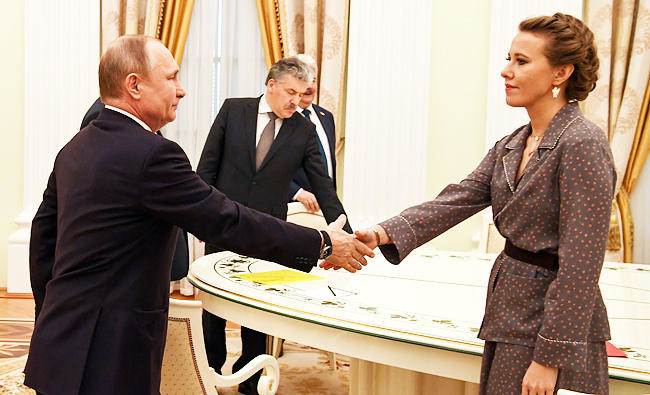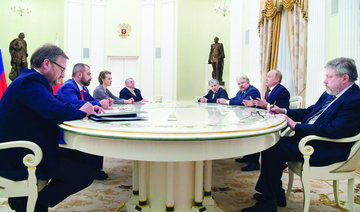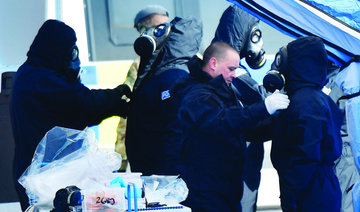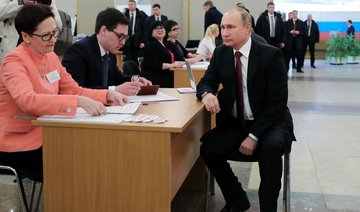MOSCOW: Vladimir Putin now has a stronger hold on Russia — and stronger place in the world — thanks to an overwhelming mandate for yet another term as president.
His domestic opponents are largely resigned to another six years in the shadows. His foreign opponents are mired in their own problems, from Britain’s messy exit from the European Union to chaos and contradiction in the Trump administration.
Even widespread voting violations are unlikely to dent Putin’s armor. And accusations that he meddled in the US election and sponsored a nerve agent attack in Britain have only bolstered his standing at home.
Here is a look at what to expect from Putin’s next six years in power, for Russia’s rivals, neighbors and its own 147 million citizens.
New Cold War?
Relations between Russia and the West are already at their lowest level since the collapse of the Soviet Union 26 years ago.
Despite a friendly-ish relationship with President Donald Trump, Putin’s new mandate gives him little incentive to seek entente with Washington, especially as the investigation of alleged Russian interference in the 2016 US election intensifies.
Putin-friendly leaders have made gains in recent Italian and German elections. Western countries are likely to see more Russia-linked hacking and propaganda aimed at disrupting elections or otherwise discrediting democracy — including the US midterm elections in November.
Since Putin’s domestic popularity bumps whenever he stands up to the West, expect more tough talk from Putin the next time he faces threats at home, and bolder Russian vetoes at the UN Security Council of anything seen as threatening Moscow’s interests.
His claim several weeks ago that Russia has developed new nuclear weapons that can evade missile defenses clearly showed Putin’s adamant determination to boost Russia’s power to intimidate.
Syria and the extremist threat
Russian-backed Syrian forces helped rout the Daesh group from Syria, and Putin argues that Russia saved the day in a conflict that had confounded US-led forces fighting against Daesh.
Now those Russian-backed Syrian forces are closing in on the last strongholds of Western-backed rebel forces.
Viewing that as a geopolitical and military victory over an illegal Western-led intervention, Russia is unlikely to pull out of Syria anytime soon.
An emboldened Putin could position the resurgent Russian military as a peacemaker in other regional conflicts — for example in Libya, where Russia has oil interests and where a disastrous Western invasion seven years ago left a lawless state now seething with extremists.
Russia’s neighbors
To Russians, Putin’s biggest victory in 18 years in power was annexing Crimea and crushing Ukraine’s ambitions to move closer to the EU and NATO.
Putin is frustrated at the resulting US and EU sanctions but appears unwilling to make concessions that would bring them to an end. Ukraine is split between a volatile government in Kiev and a Russia-backed separatist region stuck in a frozen but still deadly conflict that serves Putin’s interests.
Moscow’s actions in Ukraine sent a warning signal to other countries in Russia’s orbit that reaching westward is dangerous. And former Soviet bloc states within the EU are increasingly drifting back toward Moscow, from Hungary and Poland to the Czech Republic and Slovakia.
Fellow Russians
Putin’s new mandate could theoretically hand him the power to make bold reforms that Russia has long needed to raise living standards and wean itself from its oil dependence.
But Putin has convinced Russian voters that drastic change is dangerous, and that protecting the country from threats takes precedence over improving daily life.
Experts predict he may enact some changes like expanding affordable housing and fighting corruption on a local level.
But less likely are bigger changes such as overhauling the pension system, which is unpopular among a strong Putin voting base, or spending cuts in the security sector, unpopular among the ex-KGB friends in Putin’s entourage.
Russia has weathered a two-year recession, and inflation and the deficit are low. But personal incomes have stagnated, the health care system is crumbling and corruption is rife.
His own future
The biggest question for Russians over the next six years is what happens after that.
Putin is constitutionally required to step down in 2024, but he could change the rules to eliminate term limits, or anoint a malleable successor and continue to run things behind the scenes.
Asked at an impromptu news conference Sunday night if he would seek the presidency again in 2030, when he would be eligible again, the 65-year-old Putin snapped back: “It’s ridiculous. Do you think I will sit here until I turn 100?“
Opposition leader Alexei Navalny, Putin’s most serious foe, will face further pressure from authorities as he works to expose corruption and official lies.
Other Putin rivals such as candidate Ksenia Sobchak and oligarch-turned-dissident Mikhail Khodorkovsky will try to gain a foothold through upcoming local elections and the Parliament.
And members of Putin’s inner circle will be jockeying for position for the day when he is no longer in the picture.
Putin may revive efforts to promote artificial intelligence and other innovation as part of a focus on the younger generation, whose loyalty he needs to ensure his legacy outlives him.




























